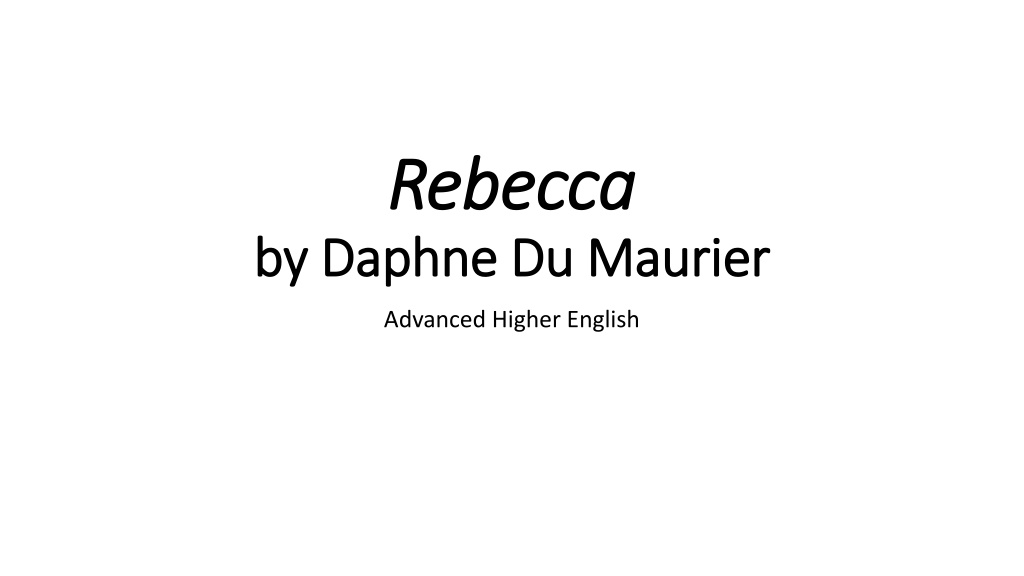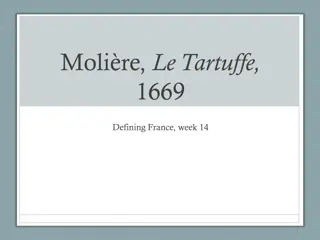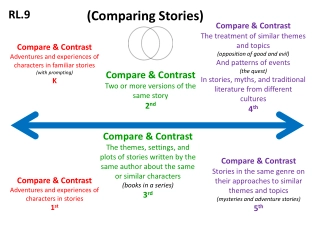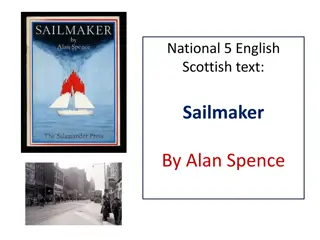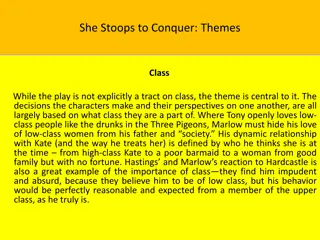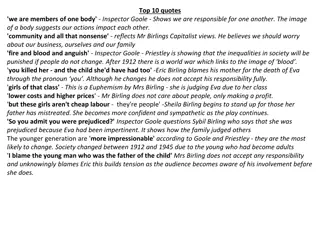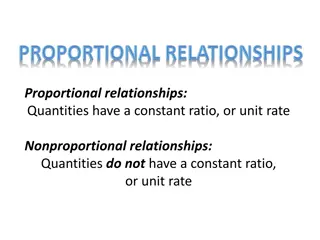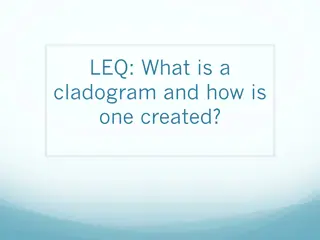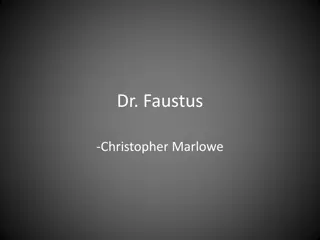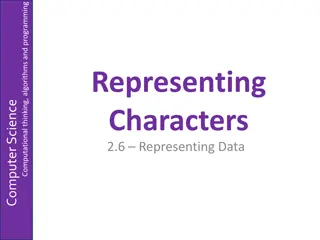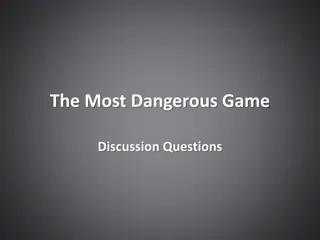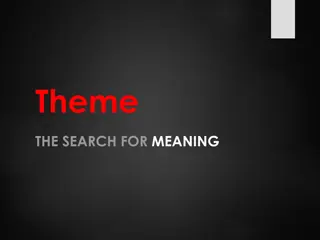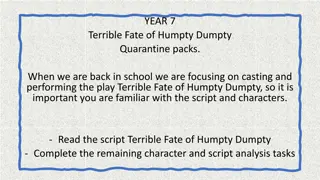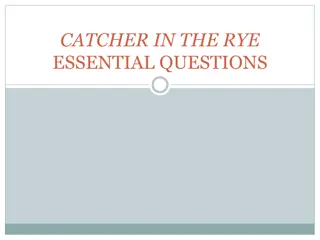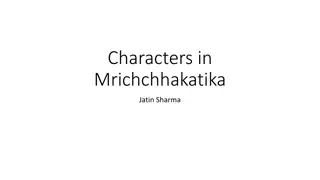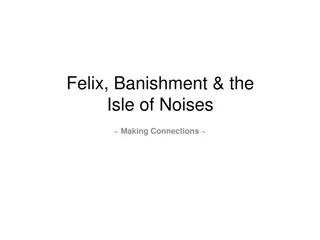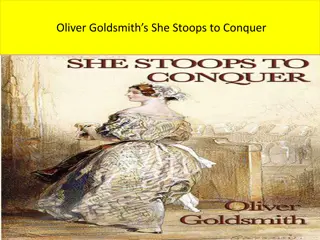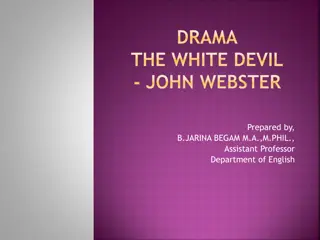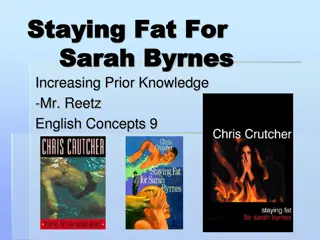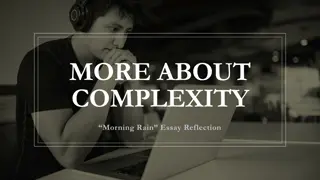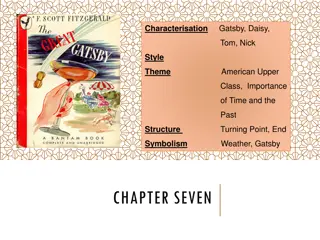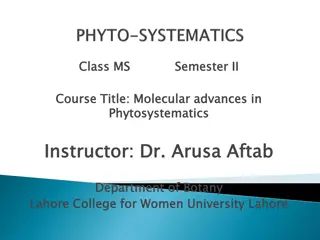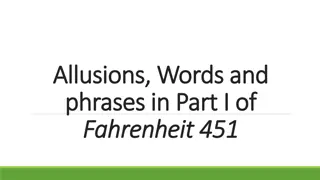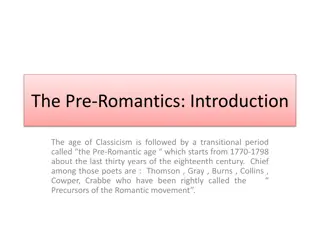Analysis of "Rebecca" by Daphne Du Maurier: Themes, Relationships, and Characters
Delve into the narrative nuances of "Rebecca" by Daphne Du Maurier, exploring the protagonist's evolution, the intricate relationships, and the emerging themes woven throughout the novel. Uncover the complexities of power dynamics in marriage, transitions, past versus present dilemmas, jealousy, and feelings of inadequacy as the story unfolds in a Gothic setting.
Download Presentation

Please find below an Image/Link to download the presentation.
The content on the website is provided AS IS for your information and personal use only. It may not be sold, licensed, or shared on other websites without obtaining consent from the author. Download presentation by click this link. If you encounter any issues during the download, it is possible that the publisher has removed the file from their server.
E N D
Presentation Transcript
Rebecca Rebecca by Daphne Du by Daphne Du Maurier Maurier Advanced Higher English
The Opening Chapter What observations can be made about the narrator? What impact and effect does the setting have? How does this chapter foreshadow the later events of the novel? Chapter 2 What more do we learn about the narrator? Consider her physical description and attitude. The setting both where they are and Manderley. Who are Mrs Van Hopper, Flavell and Mrs Danvers?
Chapters 3 and 4 Consider the narrator The Girl and Rebecca. In these chapters (and beyond), where do we begin to see where there are similarities or differences? Discuss and take notes on this use the critical reading on the blog to develop your understanding and analysis. The Girl Rebecca
Chapters 5 and 6 Chapters 5 and 6 Explore the relationship between Maxim and the narrator. You should consider: His paternal qualities How he proposes How he describes her love for him Her romantic ideals versus the reality References to age Jealousy of Rebecca Also consider where we can see similarities/contrast between this relationship and that of Jane and Rochester.
Chapters 5 and 6 Chapters 5 and 6 Discuss and take notes on how the novel explores these emerging themes: The balance of power in marriage Transition the narrator Past versus present Jealousy Inadequacy
Chapters 7 Chapters 7- -10 Mrs Danvers How is Mrs Danvers described? Consider the connotations of the language used. How does this link to the Gothic genre? 10 Beatrice, Giles and Frank What is the heroine s relationship with Beatrice and Giles? What do you think about the advice Beatrice offers her? How is Maxim portrayed in these chapters? What more of Rebecca do we learn? Chapter 8 Find and analyse all the references to Rebecca in this chapter. How does the narrator feel and react? The Handkerchief What is its significance? The Girl What is the heroine led to believe about Rebecca? At this point, what are your feelings towards the new Mrs DeWinter?
Chapters 9 and 10 Chapters 9 and 10 The Girl What is the heroine led to believe about Rebecca? At this point, what are your feelings towards the new Mrs DeWinter? Beatrice, Giles and Frank What is the heroine s relationship with Beatrice and Giles? What do you think about the advice Beatrice offers her? How is Maxim portrayed in these chapters? What more of Rebecca do we learn? The Handkerchief What is its significance?
Chapters 11 and 12 you are so very different from Rebecca. (Beatrice) kindliness, and sincerity, and modesty are worth far more to a man, to a husband, than all the wit and beauty in the world. (Frank Crawley) What are these characters trying to convey to the narrator? How does she interpret their words? What other clues about Rebecca s true nature has Du Maurier planted along the way? How has she foreshadowed this realisation about Rebecca s character? The marriage Maxim cannot understand why the narrator does not assert herself. Parent and child. Maxim is condescending and aloof in turn, this makes the narrator feel that he does not view her as an equal. Pressure on the narrator to be more like Rebecca.
Chapters 13 and 14 For the quotes below consider: Jack Favell Why do you think he visits when Maxim is away? What does the narrator make of him? - Who says it? - Who is it about? - What more does this tell us? You won t put me in an asylum, will you? You're not like the other one, he said. She gave you the feeling of a snake. Be night she d come. I seen her. She s gone now, ain tshe? Mrs Danvers and Rebecca Why does Mrs Danvers keep this room as if it is still in use? What more do learn of Mrs Danvers and Rebecca here?
Chapters 15-18 How has the narrator and Maxim s relationship changed since coming to Manderley? Why is the fancy dress ball a turning point in the novel? How are the following aspects portrayed in these chapters: - Mrs Danvers - The narrator s identity - Our perception of Maxim - Rebecca s dominance in the house and marriage
Chapters 19-20 Finding Rebecca How does the relationship between Maxim and narrator change in Chapter 19? Chapters 21-23 The Maxim Debate Should Maxim be punished for what he has done? Half class will be on the Yes team; the other will be on the No team. You will aim to persuade the class as a whole to your argument. Use up to the end of Chapter 20 for your evidence, as well as considering the consequences of killing and/or not killing Rebecca. What are the pros and cons of Maxim being punished/not punished? What does this do to our perception of him as a Byronic hero ? Rebecca Describe the Rebecca that people know. Describe the real Rebecca that Maxim knows. As a reader, do we like Rebecca? Are we intrigued by her? What redeeming qualities does Du Maurier give her, if any? How is she and the narrator - used to explore gender roles? Could it be argued that she is a feminist character?
Chapters 21 Chapters 21- -23 23 The Maxim Debate Should Maxim be punished for what he has done? Half class will be on the Yes team; the other will be on the No team. You will aim to persuade the class as a whole to your argument. Use up to the end of Chapter 20 for your evidence, as well as considering the consequences of killing and/or not killing Rebecca. What are the pros and cons of Maxim being punished/not punished? What does this do to our perception of him as a Byronic hero ?
Chapters 21 Chapters 21- -23 23 The DeWinters How has the relationship between Maxim and narrator changed? Are we more sympathetic towards him now we know the truth? Why does Maxim no longer want to lie? What does this say about Rebecca s power? Has the narrator accepted her married name? Still no first name give, though why? What does this do to our relationship with her as the reader? How about her relationship with Rebecca by contrast, why is Rebecca always referred to by her first name?
Chapters 24 Chapters 24- -26 26 Discuss why you think that Rebecca wanted to die. Use up to the end of Chapter 23 only as evidence. Chapter 24 Ben what other information do we learn from him? Why is his statement not viable? Mrs Danvers what more do we learn about Rebecca from her? Who is this Baker?
Chapters 24 Chapters 24- -26 26 Chapter 26 What is Dr Baker s role in the novel? How does this almost absolve Maxim of her murder? What more do we learn about Rebecca? Why do you think that she pushed Maxim to do it? Does this information really absolve Maxim of Rebecca s murder? What elements do we need to consider here? Why does du Maurier choose to not have Maxim face any consequences?
Symbolism Symbolism The blood-red rhododendrons and white azaleas planted by Rebecca in the grounds of Manderley. The postcard of Manderley that the narrator buys as a child. The clash of wedding presents the art books given to the narrator by Beatrice, which subsequently smash the figurine of Cupid. The satyr statue. Rebecca s boat. Manderley itself. The White Dress. Rebecca.
Symbolism Symbolism Comparisons between Rebecca Comparisons between Rebecca and Bertha Mason and Bertha Mason Both could be argued to be Gothic doppelgangers of the central characters. Discuss the presentation of these characters (and symbols) in the novel. What are they used to explore re characterisation, theme, etc.?
Themes Themes Power, Control, and Information Memory Feminism and Gender Roles Coming of Age Place, Imprisonment, and the Gothic Identity How are these explored in Rebecca, and how do they link with Jane Eyre?
Prelim Revision Prelim Revision You will be assigned ONE of the below questions and plan a response today. You will use that plan to present a response to the class. 1. The novel can deal unflinchingly with the social issues of the day. Discuss with reference to any two novels. 2. Discuss the extent to which the principal characters in two novels are limited by the external constraints placed upon them. 3. Discuss the ways in which themes of isolation and/or estrangement are explored in two novels. 4. Compare and contrast the role and function of the principal female characters in two novels. 5. Discuss some of the principal means by which tension is created and sustained in any two novels. 6. Compare and contrast the treatment of love in any two novels. 7. Discuss the thematic significance of social status in any two novels. 8. Discuss the effectiveness of the exploration of identity in any two novels.
Literary Study Essay Discuss the effectiveness of the exploration of identity in any two novels. Structure Remember to be comparative throughout. i.e. consider how both novels explore gender roles in relation to identity; what Gothic traditions, i.e. doppelganger, are used to explore identity, etc. MAKE SURE YOU HAVE A CLEAR OVERALL ARGUMENT
Setting Discuss the thematic effectiveness of the use of setting in two novels. How could this question be answered when considering both Jane Eyre and Rebecca? What common themes do they share? How are the key settings presented in the novels? What is the impact of the settings on their characters? Remember, you are not just discussing characterisation it is the setting you need to analyse in order to explore this other aspect.
Discuss how effectively the openings of two novels present central concerns explored in the remainder of the texts. Discuss the thematic significance of imagery and/or symbolism in two novels or three short stories. Discuss to what extent the main characters in two novels are shaped by their acceptance or rejection of society and its conventions.
Discuss the thematic significance of imagery and/or symbolism in two novels or Discuss the thematic significance of imagery and/or symbolism in two novels or three short stories. three short stories. OVERALL ARGUMENT: Writer s use of symbolism to highlight the struggle for sense of self/identity. Symbols: JE: Bertha Mason and Red Room; R: Rebecca and Manderly Gothic use of doppelgangers in both through Rebecca and BM; BM represents Jane s passionate side without restraint; serves as a warning of untapped passion and animalistic desire; yet also haunts Jane, who is always aware of this side of herself, and is why she chooses to disassociate herself from BM so sharply. Rebecca is very different in the sense that she represents everything the narrator is not whilst BM serves to remind Jane of a part of herself, Rebecca exists to similarly haunt the narrator, but as a reminder of everything she is not. Rebecca strong, forceful, passionate, hedonistic, cruel. She is such a strong character even the novel is named after her, not the narrator, whose name we never find out that the new Mrs DeWinter can only poorly imitate her (think costume at party; her failure to manage staff; the way Maxim disregards her utterly). Similarities between Bertha and Rebecca passionate, uncontrolled (BM through her madness; Rebecca in her disregard for the role society would place upon her, as an obedient wife) what is this telling us about the impact they have on Jane and the narrator s sense of self/identity. Identity Jane is haunted by BM before she is aware of her whispering at keyholes, laughing in corridors idea that the passion Jane feels so acutely (something brought roaring back to life by her love for Rochester) is haunting her; Jane has seen where this passion takes her; after the red room she connects it with punishment, with isolation; she understands that, for a woman, passion and desire is something to be locked away, as she was; as Mrs Reid did with the contents of her locked drawer in the red room. Any rebellion at Lowood was punished harshly. Jane uses these experiences to suppress part of herself, and Bertha is a constant reminder of that however, she also symbolises the punishment of unrestrained desire and hedonism, i.e. madness, locked away, and eventual death (though, for Bertha, this could symbolise freedom in a sense).
Red room/Manderly Struggle for identity through use of symbolism Red room reflective of her passionate nature, becomes a foreshadowing of her burgeoning sexuality later in the novel, but also her identity as a woman of her time, that these things need to be suppressed or locked away. Mrs Reid s drawer, hidden away Red room it s red, fairly obvious connotations of passion and desire, but also tied to life force; these things define Jane, and we see how unhappy, how lifeless she becomes when she disregards them, particularly in her relationship with St. John Rivers. Punishment Jane is locked here to punish her for an act of self-defence against John Reid; sense that indulging in this passion, this independent thought is something that leads to reprimand. Echoed in Bertha Mason, another woman locked away, someone who indulges in her passions without restraint, animalistic interesting that Jane finds Bertha distasteful, refers to her as it , describes her like an animal. Jane doesn t recognise the similarities they share; how self- aware is Jane, really? Struggle for identity through use of symbolism Manderly Rebecca s public side, respectable, dignified, yet her passion and sexuality hiding in plain sight red flowers in the grounds; satyr statue; even the boat, a symbol of freedom. For narrator, Manderly is symbol of Rebecca but also her lack of identity; she is never comfortable there, clear from beginning that, even after it burns down, she is haunted by it in her dreams. Punishment Rebecca is essentially executed by Maxim, no greater punishment for her sexuality and indulging in this passionate side of her nature. But also punished all along she cannot be open about her desires and behaviour; seen by all to be distasteful. Only Mrs Danvers is admiring of her strength (description of her beating the horse). Rebecca symbolic of indulging in passion, desires, but is not hidden away she is constantly there, haunting the narrator like Bertha haunts Jane (portrait of Rebecca, everyone talking about her; Bertha whispering and laughing at keyholes, setting beds on fire). However, whilst Bertha is hidden entirely, it is only Rebecca s true nature which is hidden. Narrator wants to be like her, her lack of identity is defined by the spectre of perfect womanhood that Rebecca symbolises, until we discover her true nature narrator rejects this, and only becomes more of her own woman when she steps out of Rebecca s shadow; although still defines herself by others, and her role as Maxim s carer, almost.
